#reconciliation in scripture
Explore tagged Tumblr posts
Text
Steps to Reconciliation in Addiction Recovery
Reconciliation is essential for recovery and faith, serving as a path to healing and connection. In Christianity, it goes beyond forgiveness; it aims to restore relationships with God and others. For those facing addiction, reconciliation can lead to tran
Reconciliation: A Journey of Faith and Recovery He made Him who knew no sin to be sin on our behalf, so that we might become the righteousness of God in Him~2 Corinthians 5:21, NASB95 ~ Reconciliation plays a deep role in recovery and faith, offering us a path towards healing and understanding. In Christianity, it is not just about forgiveness but mending the soul’s ties with God and others.…
#Bible#bible study on reconciliation#Biblical Teachings#christian faith recovery#christian reconciliation#emotional recovery#faith#faith journey#faith-based recovery steps#faith-driven recovery#Forgiveness and healing#God#god&039;s love and forgiveness#healing through faith#Jesus#journey of faith and healing#journey of healing#overcoming past hurts#Reconciliation#reconciliation and forgiveness#reconciliation biblical foundation#reconciliation in scripture#recovery process#Spiritual Growth#Spiritual Healing
0 notes
Text
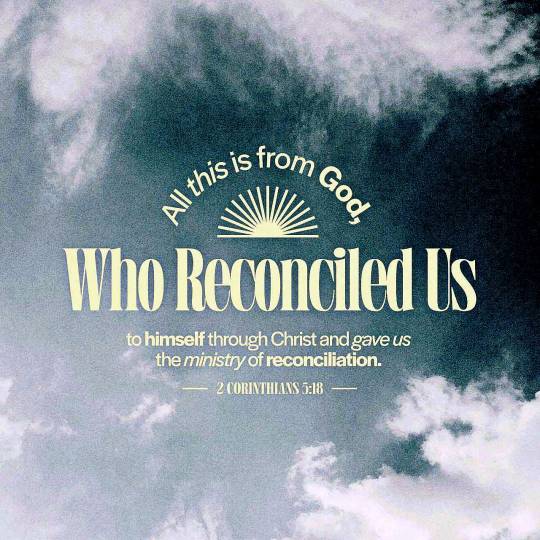
#God#Jesus Christ#salvation in Jesus Christ#reconciliation through Christ#bible verse#christianity#christian#savior#follower of jesus christ#scripture
31 notes
·
View notes
Text
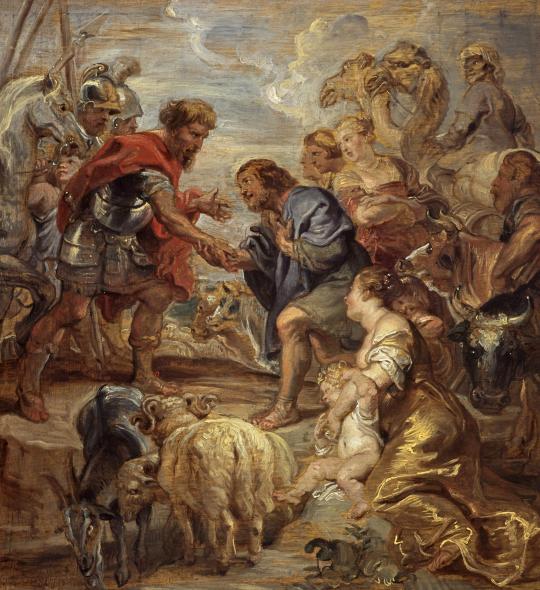
The Reconciliation of Jacob and Esau
Artist: Sir Peter Paul Rubens (Flemish, 1577-1640)
Date: About 1625-1628
Medium: Oil on panel
Collection: National Galleries of Scotland, Edinburg, Scotland
About this artwork
This lively oil sketch illustrates the Old Testament story of Jacob making peace with his twin brother Esau, many years after he had robbed Esau of his birthright.
The Story of Jacob and Esau
Jacob and Esau were the sons of Isaac and Rebekah and the first twins mentioned in the Bible. Even before they were born, they were struggling together in the womb of their mother. Their prenatal striving foreshadowed later conflict (Genesis 25:21-26).
The twins grew up very different. Jacob was “a quiet man, staying among the tents” and his mother’s favorite. Esau was “a skillful hunter, a man of the open country” and his father’s favorite. One day, Esau returned from hunting and desired some of the lentil stew that Jacob was cooking. Jacob offered to give his brother some stew in exchange for his birthright - the special honor that Esau possessed as the older son, which gave him the right to a double portion of his father’s inheritance. Esau put his temporary, physical needs over his God-given blessing and sold his birthright to Jacob (Genesis 25:27-34).
When the time came for Isaac to bestow his blessing on his sons, Jacob and his mother contrived to deceive Isaac into blessing Jacob in Esau’s place. When Esau found that his blessing had been given to Jacob, he threatened to kill his brother, and Jacob fled (Genesis 27:1 - 28:7). Years later, Jacob and Esau met and were reconciled (Genesis 33).
Both Jacob and Esau were fathers of nations. God changed Jacob’s name to Israel (Genesis 32:28), and he became the father of the 12 tribes of Israel. Esau’s descendants were the Edomites (Genesis 36). Edom was a nation that plagued Israel in later years and was finally judged by God (Obadiah 1:1-21).
In the New Testament, Esau’s choice to sell his birthright is used as an example of ungodliness - a “godless” person who will put physical desires over spiritual blessings (Hebrews 12:15-17). By his negative example, Esau teaches us to hold fast to what is truly important, even if it means denying the appetites of the flesh. Both Old and New Testaments use the story of Jacob and Esau to illustrate God’s calling and election. God chose the younger Jacob to carry on the Abrahamic Covenant, while Esau was providentially excluded from the Messianic line (Malachi 1:2-3; Romans 9:11-14).
#christian art#biblical scene#christianity#jacob#esau#reconciliation#peter paul rubens#flemish painter#baroque style#book of genesis#twin brothers#bible scriptures#holy bible#desert#camels#sheep#brothers#horses#primogeniture#flemish art#17th century painting#oil on panel#woman#baby#men
10 notes
·
View notes
Photo
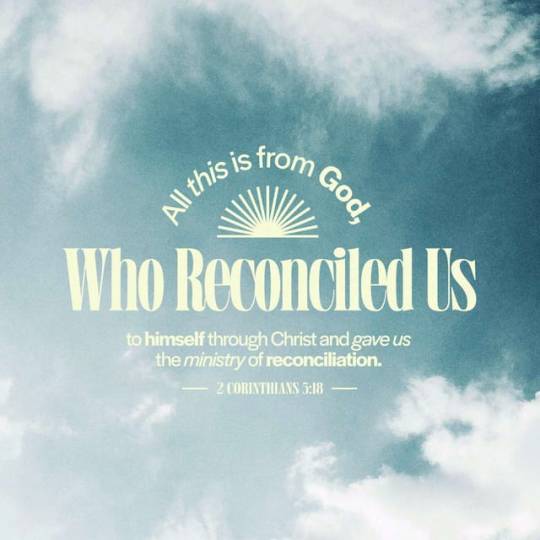
Verse of the Day - 2 Corinthians 5:18
4 notes
·
View notes
Text
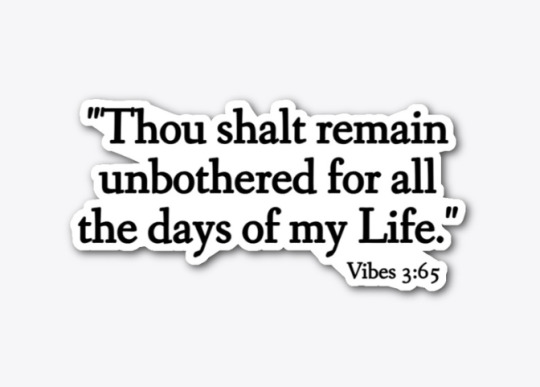
The Book of Vibes from the New Bible
#lol#bible#awareness#this human#reconciliation#waking diary#energy#unconditional love#wellbeing#manifestation#bible verse#bible scripture#bible study#bible quote
11 notes
·
View notes
Text

"We don’t need to reconcile God to us. God is reconciliation itself. God has never turned his gaze from us. It is we who have turned away from him. God had been waiting for us all along. No, not only waited. . .God has run to meet us with such overwhelming proofs of his love that it ought not possible for us to close our eyes to them.
It is not for us to appease God’s anger. God is not angry with us. Love is not resentful (1 Cor 13:5). It is, rather, God who tries to calm humanity’s anger."
~Fr. Wilfrid Stinisson
(Art: Trusting in the Lord, by Elizabeth Wang)
19 notes
·
View notes
Photo

Peace Through Christ Graphic 07 #Christian #BibleStudy #Jesus Article: "What Does 'Blessed Are the Peacemakers' Really Mean?": https://www.billkochman.com/Articles/blessed-are-the-peacemakers.html "Peace With God Through Christ" KJV Bible Verse List: https://www.billkochman.com/VerseLists/verse083.html "Don't Worry, Trust in the Lord" KJV Bible Verse List: https://www.billkochman.com/VerseLists/verse323.html "God of Peace" KJV Bible Verse List: https://www.billkochman.com/VerseLists/verse336.html "Religion of Peace" KJV Bible Verse List: https://www.billkochman.com/VerseLists/verse166.html "Fear and Peace" KJV Bible Verse List: https://www.billkochman.com/VerseLists/verse018.html "Perfect and Complete in God's Love" KJV Bible Verse List: https://www.billkochman.com/VerseLists/verse478.html "No Peace for the Sea of the Wicked" KJV Bible Verse List: https://www.billkochman.com/VerseLists/verse104.html Article: "Free From the Fear of Death: Law and Works vs Grace": https://www.billkochman.com/Articles/free-from-fear-of-death-1.html Article: "Dracula, Nosferatu, Twilight: The Vampire Fad": https://www.billkochman.com/Articles/dracula1.html https://www.billkochman.com/Blog/index.php/peace-through-christ-graphic-07/?Peace%20Through%20Christ%20Graphic%2007
#BIBLE#BIBLE_STUDY#BILL_KOCHMAN#BILLS_BIBLE_BASICS#CHRISTIAN#KING_JAMES_VERSION#KJV#PEACE#PEACE_THROUGH_CHRIST#PEACE_THROUGH_JESUS#PEACE_WITH_GOD#RECONCILE#RECONCILED#RECONCILIATION#RESTORED#SCRIPTURES#VERSES
0 notes
Text
Forsaken
We all fear rejection, but where does that fear come from? Can it not come from the fact that we are all born into rejection? We are all forsaken, because we have by nature forsaken God. Thankfully, there is hope of reconciliation.
If I regard iniquity in my heart, the Lord will not hear me: Psalm 66:18 The Word of God is full of hope, encouragement, and support for the Believer. However, there are also grim warnings, and none of these is more terrible than the silence of God. There is nothing to me more awful than the notion that there does come a point where God will leave us alone, by our own will, conscious of it or…
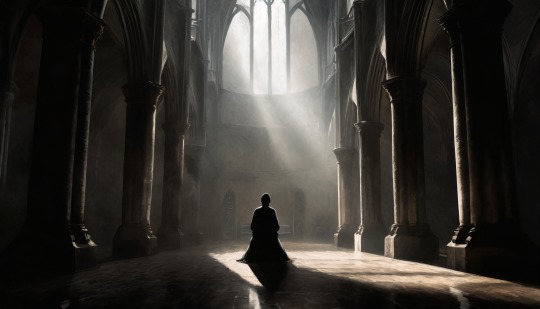
View On WordPress
#Abandoned#Christ#Christianity#Forsaken#Hope#King Saul#Prayer#Reconciliation#Salvation#Scripture#Silence#The Bible
0 notes
Text
Reconciliation Instead of Separation
In our everyday lives, we all encounter disagreements and conflicts – it’s just part of being human. Whether it’s a tiff with a friend, a family feud, or even broader societal divisions, deciding whether to reconcile or separate is a big deal. I believe choosing reconciliation, inspired by the teachings of the Bible, can make a world of difference. The Bible doesn’t just offer religious guidance;…

View On WordPress
#bible#christian#christianity#faith#god#godisgood#jesus#love#Reconciliation#scripture#scriptureverse#seperation
0 notes
Link
0 notes
Text
a t t r i t i o n
karim flam | masterlist | prologue
genesis
cw/notes: mdni/nsfw, this one is just suggestive, talk of sex, language, religion, they're literally in a confessional so, sacrilegious acts/talk, butchered script of a confessional oops, concept of sin/what's "good and evil" through the lens of religion, this fic is pushing my limits as a writer and I'm kind of here for it, written in karim's pov
-> opening hymn. . .angel of small death

"Látom."
Said in unison, but he swallowed hard upon hearing the voice on the opposite side of the curtain.
“Bless me, for I have sinned. . ."
That voice, fuck, he knew that voice.
Sinful and razor sharp, making his breath hitch in his throat from a mere sentence. A voice that brought wicked thoughts and depraved actions into their confessions; everything rotten and debauched within every thread of reconciliation. A familiarity within the cadence and tone, he felt his heart sink right down to his stomach. A feeling that festered, long since over due to bubbling over, that he pushed down even harder; shoving down any prior thought he had with a force that could kill - to maim.
“It's been a month since my last confession. These are my sins. . .”
Everything about this was wrong.
He had an ever growing feeling that the woman on the other side of the curtain knew that. Divulging lustful coated sins within a saccharine breath, erotic details that had no such business within a holy place. Acutely aware of the smirk that hung on her lips with every sin confessed - he heard it. He could feel it. Hitting him right in the stomach and bringing him crashing down with every syllable that left her upturned lips. Every righteous thought hammered into the very fiber of his soul screamed at him that this was wrong; this was evil.
". . .I seem to have an issue with lust of the flesh. . ."
He should stop this.
He grabbed at the thick black fabric of his pants, just above the knee, in hopes to center himself and pull himself back. To not let his thoughts wander again - to not sin again. But he listened all too attentively, hanging on every single word, every so called confession, that left her lips.
He didn't want to stop this.
". . .you're the same priest as last time, aren't you?"
Interrupting her own confession, interrupting every thought he had of remaining calm and collected. Interrupting the bashing of memorized scriptures in his mind, as he repeated them over and over and over as she spoke.
"Yes." A nearly breathless reply. Furthering him to clasp the black fabric tighter, white knuckling the seams with sweat slicked hands, and clench his jaw.
He heard a hum.
"Good."
He wanted to wretch, the amusement in a single word made him nauseous. He didn't know a word to have such a dreadful effect; an effect that made him grit his teeth from the desire filled tone that swallowed the word whole. Screwing his eyes shut as to not further himself astray. Sin filled thoughts already creeping into his mind that he took with an iron grip and forced to the deepest parts of his mind; he prayed they would never surface again.
He was a righteous man, a holy man, one of which shouldn't dare entertain even the mere idea of such wicked actions. But the moral sin of desire was a treacherous one to fall to; falling to his knees in attrition - such false repentance - as the stain of lust was his only folly.
"Now make a good act of contrition." Uttered through gritted teeth and closed eyes, following a script within the caverns of his mind. He heard another hum and felt his resolve start to crumble at his feet.
"I firmly intend, with Sol's help, to do penance, to sin no more, and to avoid whatever leads me to sin."
No you won't, is what he wished to say. He instead took a deep breath and held it, pausing a moment as he wracked his brain of another prayer. The only salvation in the moment being she would leave soon, to leave him a mess of a man - but righteous nonetheless.
"Aren't you going to pray for me? Tell me my sins are forgiven?"
Dammit.
"I absolve you from your sins," spoken in a single breath. Forced through his teeth, knowing forgiveness meant nothing to the woman beyond the curtain - she didn't care. "Látom." Cleansing heinous actions, disgraceful words, and his own mind within a single word.
"Látom."
"Go in peace."
"I have every intention to. Thanks be to Sol."
He felt his breath return to him once he heard her leave; nearly out of breath as he filled his lungs with air. Putting his head in his hands and letting put a groan.
"God forgive me for thinking such things."
#fire force#fire force x reader#karim flam x reader#fire fore smut#karim flam smut#tw religion#tw religious themes#tw blasphemy#series: attrition#karim flam#en en no shōbōtai
33 notes
·
View notes
Note
This isn't an accusation of hypocrisy. But you run an 18+ blog, and you're openly bi. I thought open sexuality is generally seen as impermissible or forbidden (not that it's really stopped anyone)? Like I know there's a rich tradition of openly queer poets and whatnot in the Shi'a world, but those were arguably more secular times. Do you have authorities you look to who defend LGB(T) issues? I saw you recommend Ahlulbayt; aren't they pretty conservative on these grounds? Is it something personal like your own understanding of the Qur'an? Something else? This is a good faith question; like I'd like a resource for some less studious Muslims I know who are gay but believe there's no reconciliation with their faith. Sorry if you get this too much.
I am very well aware of the things I do, I mean, I'm a porn artist, that enough should entail a pretty significant transgression.
The point I'm trying to make is that Islam for me is fascinating, I find its history and tradition to be extremely interesting to me, especially as someone who was fostered in a Muslim household. It's obvious that I hold my religion dear, but there are a lot of things that compromise with my sense of morality, and no matter how much I study it, there's no way I can harmonize it with my sexual identity. Questions such as LGBTQ becomes a highly discussed topic, because it's obvious that no matter how you try to rationalize LGBTQ within an Islamic framework, it's impossible, given how clear the prohibition is in the Scripture.
While I may be a theist in a sense but with a strong adherence to Islamic religious identity, there are a lot of things strongly attributed to scripture that you must adhere to. Your moral objectivism is strongly shaped by Scripture, so you are forced to submit to the various laws, regulations and ideas that may contradict with your moral perception of the world. But I'm not here to take away peoples' happiness; I believe any LGBTQ Muslim, whether religious or spiritual can find peace in the religion, and whether that is a contradiction or not, you should not exclude them from their religion. Spirituality and religion are two different things at the end; religion is a personal matter. After all, Islam has many strong points and forms an important cultural and religious identity but archaic societal norms simply can't be upheld in a world that is rapidly developing and changing, and Muslims must come to terms that homophobia exists within their scripture, as is the case with all abrahamic manuscripts.
185 notes
·
View notes
Note
This may be a bit of a dump question but I've always wondered about this and I thought I could ask this from you since you seem to know more about it. I hope that's okay! Are the translations of the bible and their differences very important? Are the messages that the writings send us that different from each other depending on the translation?
it's very important. translation is an art, like anything else. from a semitic language like hebrew or arabic, it's difficult and often impossible to fully capture the meaning of a word in the original text using english (or any other language). in judaism every stroke of every letter is thought to be an emanation of God: he is the words themselves. the quran is the word of God exactly as it was transmitted to the prophet. so abrahamic religions, bar christianity, place extraordinary important in literal meaning, because you encounter God not only in the meaning of the words but in their very essence, their form and shape.
scriptural translation has always, always been fraught with problems. for instance jerome, developing the vulgate, encountered exodus 34, where moses encounters God face to face and is transformed with rays of light. the hebrew word for this transformation is קָרַ֛ן, and jerome translate it to "cornuta," horns: for centuries afterward moses is depicted in art as having horns, like a goat, because of this mistranslation. it may be that jerome meant "glorified" rather than "horned," based off his later commentaries and use of the term by previous exegetes, but the fact remains that outside of the theological sphere this single word, translated to a western language, stripped back meaning tragically. even to the extent that it propagated harmful stereotypes about jews.
or consider the use of the word "atonement" in english translations of the new testament: katallage, used in romans 5:11, is translated as atonement, but it actually means "reconciliation" or "restitution." in fact, jesus never speaks of atonement. in the old testament the word translated to atonement is כָּפַר, "kaphar", which means "covering." in 1 peter 4:8 we are told, "love covers over a great number of sins." how different would christian understandings of atonement be if we translated "kaphar" as "covering" and not atonement? forgiveness for wrongdoing becomes not something we offer to or beg from God, but something to which we submit, because the action is removed from us, humble as we are, to the great forgiver- the great lover.
i say all this to contextualize the difficulty of translation to begin with. but in the sense of critical pedagogy, every translation of any religious text is subject to the bias of the translator. a good translator is conscious of their bias and seeks to remove it from their work. but christian scripture has an agenda. it is not only something we read for a personal relationship to God but something that is used to dictate right behaviour, as a means of social control, something that develops culture. if a person translating a text has this in mind, they can construct the meaning of the text towards what version of a society or culture they feel is "right," based on their personal and invariably biased understanding of a text. this is why i dislike the kjv translation and never recommend it. the kjv is a product of its time. it is not a good translation of the bible: it is old, but it is not the oldest english translation, and its meaning is absolutely skewed. this is difficult, because many evangelical christians believe the kjv is the absolute word of God, and they are already wrong, because no translation will ever be absolute truth: it is only translation.
words are a limiting system. when we try to capture the essence of something like a god, we are limiting him to our vocabulary.
i always recommend the nrsv because it is version i use for scholarly work. it isn't beautiful but it is as close to a "correct" translation as you can get. but i always supplement my reading with other tools: the jewish annotated new testament is wonderful, for instance, and biblehub has detailed interlinear translations of different translations and the original text. but i am also aware i will never be able to fully comprehend the depth and beautiful of scripture until i learn hebrew and greek, at minimum. but this should not discourage anyone: scripture is meant to be read. but it has to be read actively, critically. God wants you to swallow his words, but he needs you to chew them first.
40 notes
·
View notes
Text
Christ Commanded us to Forgive

Charles Brooks (1795–1872)
And forgive us our debts, as we also have forgiven our debtors — Matthew 6:12
By “our debtors” are intended those, who, in any respect, injure us, either in our persons, reputation, interest, or comfort. The Christian duty of forgiveness does not require a stoical or affected insensibility of such injurious treatment; for the gospel aims to regulate, not to extinguish the innocent feelings of our nature. Nor does the duty forbid our expressing to the injurious party a proper indignation and grief at his misconduct, and prudently attempting his conviction and amendment—on the contrary, the Scriptures enjoin us to go to our offending brother, and privately tell him his fault: its direction is, “You shall not hate your fellow countryman in your heart; you may surely reprove your neighbor, but shall not incur sin because of him” [Leviticus 19:17 NASB]—Nor does the duty in question prohibit us seeking satisfaction from those who have injured us. The laws of God, of self preservation, and of civil society warrant us, in such cases, to do justice to ourselves. The laws of Christianity require the injurious person to go and make satisfaction to his offended brother, and even to defer the performance of religious worship till he has honestly attempted this reconciliation.
The duty of forgiving offenders, implies, in the first place, that we really love them notwithstanding their pernicious conduct. We are to distinguish between the person and the fault; and to feel that he may become a good man, and then a good friend… The indulgence of an angry, sullen, malicious disposition towards an offender, is strictly forbidden. It is as remote from Christian forgiveness, as darkness is from light.
Secondly —this duty implies, a sincere desire and a resolved pursuit of the welfare of those who have injured us; and a heartfelt satisfaction in their amendment, and in their temporal and spiritual prosperity. He who thirsts for revenge or exults at the misfortunes of an offender has not the Christian spirit.
Thirdly—this duty requires a readiness of mind to confer with the offending party, to be reconciled to him on mild and equitable terms; and on his offering due satisfaction, to comfort him with the swift and frank assurance of our forgiveness and kindness. He who is only forced into reconciliation, betrays dark symptoms of latent enmity. The gospel requires a forgiving spirit and this spirit must be fixed, habitual and ready—not blind, and yet without wrath; not precipitate and yet free.
14 notes
·
View notes
Text
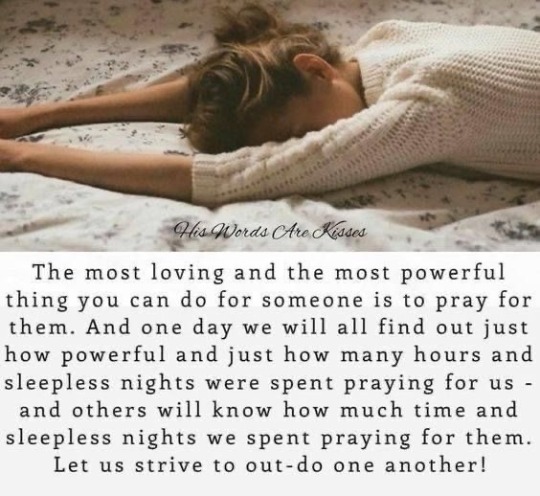
Just because you know the truth doesn’t mean you are in charge of convincing others of the truth. One of the ways we show God a huge lack of trust in His Word is trying to convince people of something we know would change everything for them.
We can lay out before someone the absolutely indisputable proof of the truth, and will not be able to receive it unless God has unrestrained their eyes and opened their understanding. This is scriptural truth. The most powerful and loving thing we can do for them in this case, is to pray for them.
In Luke chapter 24, the Bible says that some of the disciples were on their way to Emmaus, and Jesus came along and joined them - even asking them what they were talking about, but they did not recognize Him. The Bible says their eyes were literally restrained from recognizing Him.
They had been walking with Him for 3 years - and they had even “felt” Him but did not know why. Later, after they knew it was Him they mentioned how their hearts had “burned within them” as He spoke with them. But Scripture says that they could not know it was Him until He opened their understanding.
Jesus says, in the gospel of John - chapter 6, that we cannot even want to be His unless He draws us to Himself. He goes on to explain that everyone that The Father has given Him will come to Him, and He will draw them to Jesus. Jesus says that He promised The Father that He would not lose even one of those that have been given to Him, and that no one can snatch them out of The Father’s hand. The Bible also says we only love Him because He first loved us in 1-John 4:19.
We are so blessed to be permitted to participate in this beautiful thing as His ambassadors!
We have been given the ministry of sharing His “message of reconciliation, as though God were pleading to them through us to be reconciled to Him!” (2-Corinthians 5:18-20)
We share the message - and He convinces. And there are times we will discern that their ears are closed to the truth at that moment for whatever reason, but we know exactly what to pray for! Because they cannot receive the message unless God Himself has prepared their hearts and opened their understanding.
🙏🏻
5 notes
·
View notes
Photo

Peace Through Christ Graphic 10 #Christian #BibleStudy #Jesus Article: "What Does 'Blessed Are the Peacemakers' Really Mean?": https://www.billkochman.com/Articles/blessed-are-the-peacemakers.html "Peace With God Through Christ" KJV Bible Verse List: https://www.billkochman.com/VerseLists/verse083.html "Don't Worry, Trust in the Lord" KJV Bible Verse List: https://www.billkochman.com/VerseLists/verse323.html "God of Peace" KJV Bible Verse List: https://www.billkochman.com/VerseLists/verse336.html "Religion of Peace" KJV Bible Verse List: https://www.billkochman.com/VerseLists/verse166.html "Fear and Peace" KJV Bible Verse List: https://www.billkochman.com/VerseLists/verse018.html "Perfect and Complete in God's Love" KJV Bible Verse List: https://www.billkochman.com/VerseLists/verse478.html "No Peace for the Sea of the Wicked" KJV Bible Verse List: https://www.billkochman.com/VerseLists/verse104.html Article: "Free From the Fear of Death: Law and Works vs Grace": https://www.billkochman.com/Articles/free-from-fear-of-death-1.html Article: "Dracula, Nosferatu, Twilight: The Vampire Fad": https://www.billkochman.com/Articles/dracula1.html https://www.billkochman.com/Blog/index.php/peace-through-christ-graphic-10/?Peace%20Through%20Christ%20Graphic%2010
#BIBLE#BIBLE_STUDY#BILL_KOCHMAN#BILLS_BIBLE_BASICS#CHRISTIAN#KING_JAMES_VERSION#KJV#PEACE#PEACE_THROUGH_CHRIST#PEACE_THROUGH_JESUS#PEACE_WITH_GOD#RECONCILE#RECONCILED#RECONCILIATION#RESTORED#SCRIPTURES#VERSES
0 notes